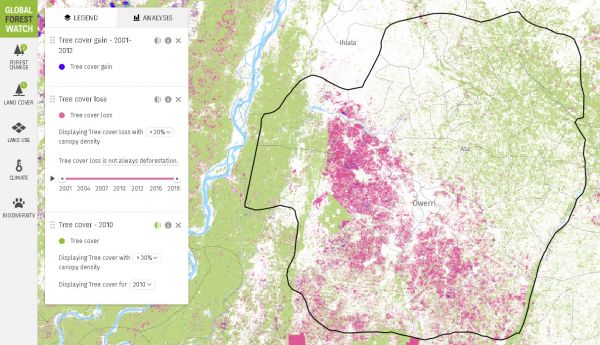Plant a tree against poverty

Share with your friends
Reforestation protects the environment, increases food supply and income
SOSUIBEN REFORESTATION PROJECT
Reforestation is the consequence of deforestation which according to the United Nations Food and Agriculture Organisation, is a complete clearance of trees, while deforestation is usually planned and deliberate felling of trees and the land cleared is used for activities which are not related to the forest.
The act of re-growing trees in an area or land surface is reforestation which basically is re-planting of trees in a stretch of terrain which had for some reason lost its forest cover.
SOSUIBEN’s reforestation project is a planned programme to re-grow vegetation that is lost due to human activity, natural calamity or sudden climate change. The project is aimed to protect the environment, maintain soil texture and increase food supply.
In addition to the climate benefits, reforestation has the potential to preserve endangered species. A recovering forest restores habitat loss and degradation and threats to species health. It is evident that rapid felling of trees leading to deforestation of large parts of the globe, led to soil erosion and thus SOSUIBEN has decided to embark on this project to protect the earth by partnering with local communities in Nigeria to plant crops and trees in designated areas. So far the concerted effort applied by these Nigerian local communities has led to increased harvests of the food crops, and massive income from sales and trading of the harvested crops and ultimately the reforestation of degraded lands in the region.
The crop in question, the gnetum africanum plant, is one of the most popular food crops in Nigeria. The leaves of this plant are the main ingredients for making a local soup known in various parts of Nigeria as Ugu, Uha, Afang, Okazi, Olugbu, and others. It is estimated that Nigeria imports over 4,000 tons of Afang leaves annually from neighbouring Cameroon, to complement high demand of the local consumers.
Salient Points:
1. There are over 1,000 seedlings of popular Gnetum Africanum crop currently planted by the local community in Nigeria
2. More than 60 individual farms are being nurtured by trained community members and professionals
3. There are about 479 students trained on Afang plantation and harvesting
4. Put together, Ugu, Uha, Afang, Ukazi, and Olugbu are considered some of the most vegetables eaten by at least 70 million people in the Nigerian communities.
As a result of hyper degradation that stems from the high usage of these vegetables and all other popular trees they are at the point of eradication in Nigeria. As the local people comb further afield to harvest these rare crops and fell these trees, both for food and for sale in the local markets, a massive degradation of the forests where the crops and trees are found is taking place. The need to save these crops and trees in Nigeria has therefore become not only an economic issue of boosting food production and raising local incomes, but also an issue of conservative environmental preservation, thus SOSUIBEN took the initiative to embark on this reforestation project.
The above notwithstanding, SOSUIBEN as an International Humanitarian Organisation is equally dedicated to providing Solar Renewable Energy, Education and Health care solutions to the less privileged ones in Africa, especially to the street Children and Ex-Child Soldiers from war raven Countries of the Continent. We have established ourselves as an important humanitarian conduit in Nigerian and the Central African Republic with several projects in Hospital, Schools, Roads, drinking Water, Sport and Agricultural development.
Donate to our humanitarian cause. We pledge to plant 1 tree for every 10 USD worth of MintCoin you donated which is successfully converted to fiat currency.
